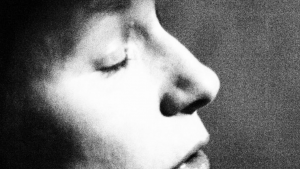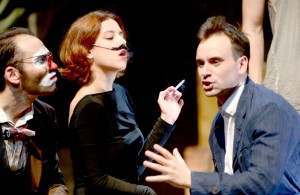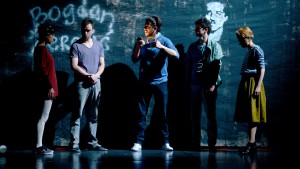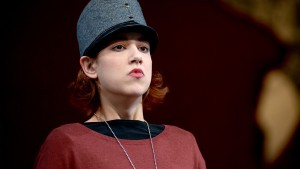…ONLY DEATH IS CERTAIN
“What is the truth, people, children? Who is right? What could have been if this hadn’t happened? How can one tell… Would it have been better, or worse? Is there a truth? What should one fight for? Is it all a lie?”
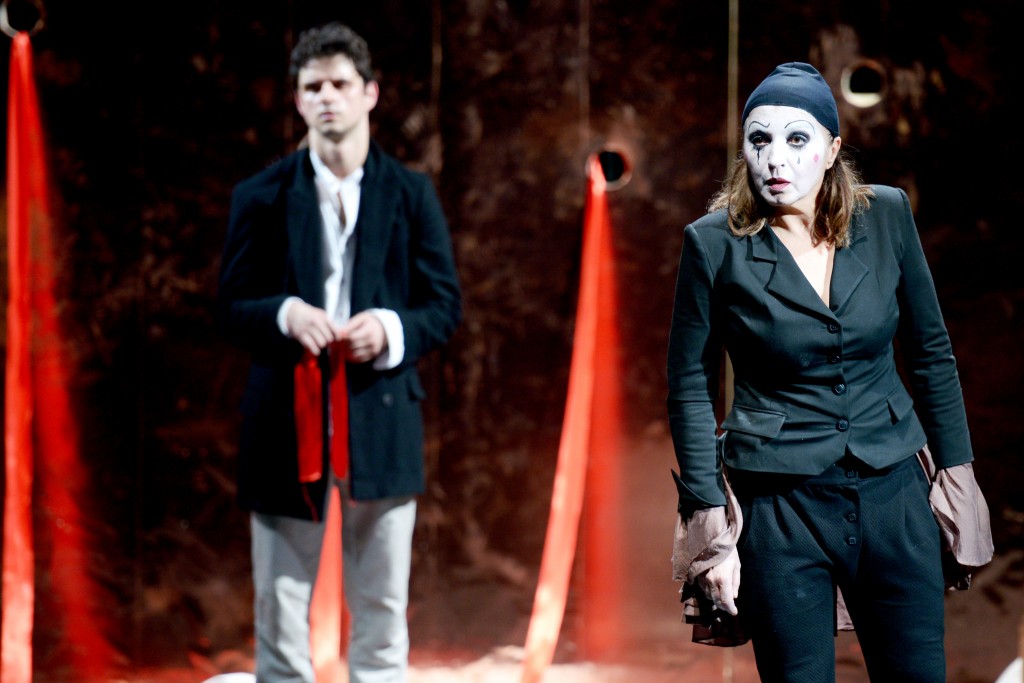
The questions that the Schoolmaster asks himself and his students at the very beginning of
The Dragonslayers — and the parataxic shortness of breath he utters them with is a proof of this — are not posed solely to explain a certain historical fact along with the answers (the Sarajevo assassination). They are there in order for their answers to potentially attempt to explain both the meaning and possible consequences of each human action. The Dragonslayers by Milena Marković is thus not a history play, not a political play, or not exclusively so, it is a play about life in which high ideals and “much too human” desires are entwined, conflicted and evened out by death; a play in which both body and soul suffer; in which the privileged and the happy are few but also powerful enough to do evil with impunity and from whom one most often shields oneself by getting out of their way; in which massive political projects of professional ideologists are mixed with instinctive human strife for a better world. In this complex picture people are viewed in what is everyday and what is historical (about to turn into History), in this picture they are seen in their realistic proportions, as are their similarities and differences, their virtues and weaknesses, their journeys and transformations, and their endings.
The Dragonslayers is therefore a complex dramatic creation in which all is fragile and mutable like kaleidoscopic scenes and not easy to approach with instruments of standard dramatic analysis.
This we venture with great caution.
“Heroic Cabaret” or the question of genre
Genre, when cited, as is the case in The Dragonslayers, is the first signal of the author’s relation to the world they speak of, and is an indication of the way it will be portrayed. Cabaret is a subversive kind from its very beginnings (early 19th century), where political turns into metaphysical (seen as thoughts about “ultimate matters”) and vice versa, melancholy and satirical fierceness alternate, and there is always a danger of it being proclaimed irreputable, or rather, out of sync with the prevailing opinion. The adjective heroic that Milena Marković puts in front of the word cabaret does not diminish its subversive force, does not add an oxymoron ring to the term, because heroic is indeed subversive, it represents an excess in relation to the established order of things, it is its visible opposite.
Cabaret is at the same time a dynamic kind, in which styles are mixed, in which prose and poetry (in a broad spectrum of its sub-categories) alternate, in which transformations are swift and apparent, in which each scene has a point that can be wistful, ironic, protesting, menacing to the extent of a macabre memento mori, but with no “dogmatic quotes over someone who is mortally wounded” (Krleža). And it is this very absence of the dogmatic that distinguishes it from Piscatorian political revues and Brechtian parabolic didacticism, even though their téhnё and their objectives are akin.
In its construction, its scale, The Dragonslayers are also a kind of rhapsody (in the sense modern theory of drama attributes to this word): a narrative continuity established by blending exemplary fragments of the fundamental storyline (“dynamic editing”), visible, most often lyrical, joints between them, diversity in the modes of expression (dialogue, monologue, choir), idiomatic diversity, mixture of the fictional and the documentary, where the latter is primarily a support, a verification of truthfulness of the fiction’s “careful devising”.
Who are the dragonslayers?
Nietzsche, Birth of Tragedy
Each of the three participants in the assassination of Archduke Franz Ferdinand during his visit to Sarajevo on 28 June 1914 could have been the actual perpetrator of the murder. It could have been Trifko Grabež or Nedeljko Čabrinović or Gavrilo Princip, because all of them shared the same goal. Stationed along the road along which the Archduke was supposed to pass, armed with bombs and revolvers, insufficiently prepared to use the weapons, endowed with something resembling sugar water more than actual poison they should have terminated their lives with following the accomplished assassination, these young men were most reminiscent of young village men from folktales who, when none of their superiors in age and strength have the courage, challenge the dragon who tyrannises the people and slay it. And this dragon from pre-political folklore imaginarium was in fact a substitute for anyone who reigns tyrannically, be it an emperor or a local lord. To this folklore figure of a tyrant Nietzsche opposes a generation of dragonslayers, one he doesn’t merely foresee, but has a chance to see all around him, more so than anywhere in the domain of the two empires, Austro-Hungarian and Russian, both of which, particularly in the wake of the revolution of 1848, are inundated with secret revolutionary societies, interlaced with conspirators’ enclaves, in which a single dream is dreamt — ousting the tyrants and creating a juster world in which one would live “wholly and fully”. The entire South Slavic space included in the “dual” monarchy was rightfully considered to be its most tumultuous region. For, even there, the least expected was taking place: eruptive awakening of national awareness with a fierce strife for South Slavic unification, a birth of a generation thirsty for knowledge, passionately interested in political ideas, primarily those of an overthrow, from which stem a firm ideological ground for reshaping the world. These are no longer mere romantic reveries of poets that stir spirit, these are now solid political programmes in a wide range from Herzen’s calm socialist thought, to Chernishevsky’s ideas of a juster society and Communist Manifesto, to Kropotkin’s anarchism, around which young rebels gather, whilst the unsettling spirit of Nietzsche hovers over it all, sowing despair and offering blinding hope.
At that point, removing a tyrant is not conceived as distinct from the act of his assassination, i.e. an individual act, nor could it have been conceived in any other way. The proof of it is also a series of attempted assassinations in said region, preceding the one of Sarajevo and serving as a compelling example for the latter. Claiming that these young assassins are just mere weapons with which Serbia of the time wished to attain its goals of conquest would mean denying these tragic heroes’ self-awareness, their ideological preparedness that was not a result of a drill but drawn from books they came by through selection on the bases of affinity, and thus attained knowledge by far exceeding anything they could have attained during their short and burdened sojourn in this Slavic “Piedmont”. Their ideas on the South Slavic unity, their strife for social justice have no touch points whatsoever with political goals of Serbia, deeply rutted in Balkan wars, in spite of their Byronesque rush to join in them. This ‘heroic cabaret’ is an homage to the souls of these pure young men of whom Milena Marković writes with understanding and profound feeling of commiseration.
In The Dragonslayers, the afore mentioned direct participants of the assassination are joined by, in the roles of helpers, almost entirely following the Propp’s pattern of functions of characters in a folktale: Danilo Ilić, also dubbed a dragonslayer, even though he has no part in the assassination and could more than anything be considered a sort of a protective older brother figure who calls to patience, caution and is ‘not sure it is the right way’, Veljko Čubrilović, no less reserved than Ilić about the radical intent of the high school students, convinced ‘people should be elevated through culture and education and not in other ways’, even though he helps the future assassins smuggle weapons (how few are the years it takes for a young man to be infused by caution, usually called wisdom!), and the peasant Mitar, a reluctant participant in the same business, terrified by the very thought of weapons as his family history instructs him one should stay away from them (he is the only one here intact by knowledge, intact by ideology, someone who endures and has no hopes whatsoever).
All these “angry young men” (that would post festum be called the Young Bosnians) have as their immediate role model, as an imago of a martyr, Bogdan Žerajić, this melancholic loner, a failed assassin and suicide, who reads Schiller’s William Tell and Kropotkin’s The Great French Revolution at the same time, and for whom it will never be known whether he was more discontent with the world or himself.
On the other end of these rolemodels and indirect helpers stands Vladimir Gaćinović, an ideologist, a teacher and a “man of the world”, who, far from the mud of the Balkans he had been cruising for a long time, right in the heart of Paris, leads conversations with Trotsky and ponders about “what we are to do”. And it is all these said agents of an all-encompassing European revolt that will, with almost the same outcomes for its participants, end in the mud and blood of World War One and the October Revolution that Milena Markovic introduces into her play, creating from the seventeen scenes “a chain of revolt and causes” (Barthes) in order to perceive and understand what had, as in any tragedy, been inevitable.
How the story is told
The scenes proceed in the following sequence and each of them has a title presented to viewers in neon lit letters: Classroom, Žerajić’s Grave, Europe, Great Big World, Little Gavro of Glamoč, Quarry, The Future, Gavrilo and Danilo, Gavrilo Kisses Serbian Soil, Belgrade Zeleni Venac Street, The Weapon’s Way, Gavrilo Princip Bids Farewell to Life, Čabrinović Parts With His Life, Assassination, Trial, Dance Macabre, Lady Death and Gavrilo Princip. No scene is exhausted by a single event, on the contrary, they multiply, they follow each other in fast succession, and their sequence is not strictly chronological. As a whole, regardless of the way they’re told, they illustrate the subject of a particular scene, they are either its life context or its psychological foundation or its lyrical-meditative explication. Moreover, each scene has reduced, but clear characteristics of the setting, it has an adequate atmosphere created more often than not by accurately selected side characters, it has its characteristic linguistic tone and rhythm, changing not only in dialogues, depending on where they take place, appropriate situation, subject of the conversation and its participants, but also in songs and recitative passages. (And this all-encompassing, fascinating polyphony must by all means be reflected in the director’s procedure as well). The play opens with a didactic step away from the period of the primary storyline, a contemporary scene of a history lesson where Schoolmaster attempts to glean what his pupils think about what had happened “just before World War One. Meaning, when the waltz stopped. When the music in the park stopped, when bodies paved the world. Young bodies, like yours.” Their responses profile the generation of the here and now: alternating and mutually conflicting learned political phrases about the constitution of the world and its injustice (which is not to say they are not expressed in a heartfelt way) and deeply rooted stereotypes of what could be considered happiness and who it is that disrupts it, with a feeble voice at the end of the dispute of the one who thinks “it’s a lovely day” and this being the only thing she thinks about.
In the overall construction of the play, this is a sort of a dramatised prologue that, as a group scene set in contemporary times, through overall transformation of all previous characters, turns into a historic fact: in the “Six Bullets Song”, the emblematic figure of Žerajić is introduced like a flash that cruelly dies with a single sentence of “He fired, poor wretch, but missed”. And the story that follows, in itself whole and primarily focused on the short life’s journey of the dragonslayers, will be told from various perspectives and in various ways, it will be set in various spaces, in various social and professional milieus, in order to be displayed for us to see and exposed to the judgement of those (meaning, us) whom the motto of The Dragonslayers’ line from the Gospel, from Matthew,with its opening words reading: “Woe to you, scribes and Pharisees, hypocrites!…”
World of the dragonslayers in the eyes of Europe and the Great world
For those ruling Bosnia following the annexation, this country is perceived as an anthropological unknown looked upon with curiosity and repulsion, and treated with a ruler’s confidence and obligatory cruelty, none of which ever exceeds the framework of typical behaviour of colonisers. Just as the dream of ousting them is the everlasting dream of the enslaved.
Milena Marković views this conquering Europe in its most typical characteristics: in its arrogance (with the seed of racism already budding), and its triviality. And everything about the scenes with European Scientist by and large forebodes a dark grotesque with millions dead in the background.
For those who dream of a juster world, Bosnia is dark and miserable and Gaćinović’s image of it must have reminded his collocutor Trotsky of Russia: the same “confusion, opportunism, class egoism … personal enjoyment, petty, petty and greedy” on the one hand, and ‘bare suffering’ on the other. Above this, too, hovers a question: who to rely on, who to count on in the planned “great overthrow”? And the answer: “Youth is the solution”.
Life, longing and suffering of the young dragonslayers
In the lives of Gavrilo Princip, Danilo Ilić and Nedeljko Čabrinović (the play gives us scarce information on Trifko Grabež), there are no coincidences, not a single fortunate step away from their tragic predetermination. Thus, it had to be known what environment they hail from, who their parents were, who their friends were and what had made them, every one of them in particular, take the road they had chosen themselves.
By the brief historically confirmed pieces of information, the Schoolmaster, as if resuming a previously commenced lesson, makes an introduction to the scenes (images) in which, along with the author’s “careful devising”, the main characters are formed. They all come from a world of poverty and they all share a precocious, unsettling maturity. Marked by their social status (peasant’s, labourer’s, craftsmen’s), they also share the misfortune of being outcasts from the environment they belong to: since his earliest youth, Princip suffers ridicule from the rural environment he came from; Čabrinović is in a conflict with his father, loyal to the Emperor as he would be to any other government, but on the other hand fierce at the least sign of his son’s insubordination; Ilić, already tormented by hard work and touched by illness, is accepted by the very environment whose rights he fights for with mild contempt. Their fellowship is founded on the shared goal, which merely alleviates but doesn’t annihilate the differences between them. (Their life journeys, had they not been cut short, would certainly demonstrate these differences more pronouncedly.) They are friends too, but their conspiratorial position necessarily deprives them of greater closeness. At the same time it renders them inaccessible to the world of the ones closest to them and thus increases their loneliness. Even their stay in Belgrade is marked by suffering and being cast out. Their conspiratorial gathering in which they forge their plans for the assassination resembles a gathering of compatriots who frequent “their” tavern and no other and only trust “their own”. Milena Marković emphasises this (perhaps even reluctant) loneliness, underlining thereby the independence of their decisions and a clear distinction between their patriotism and their political convictions. (This is confirmed by the fact that it is only in the scene of “Trial”, based entirely on documents, that National Defence is mentioned once, in the question the President of the Court asks not the participants of the assassination themselves but Veljko Čubrilović).
Is Gavrilo Princip the only one who could have committed the assassination?
Gavrilo Princip is the only one of the assassination participants who manages to carry out their shared intention. Firing a few bullets, he kills Franz Ferdinand and his wife, the Duchess of Hohenberg. In one of the scenes from the trial, having stated earlier that it was not his intention to kill the Duchess and that he was sorry for it, Gavrilo Princip responds with two brief curt sentences to the question of the President of the court of “Why did you murder her?”: “I didn’t mean to do that. There must be casualties”. But, these are not the only sentences with which it is made clear, in The Dragonslayers that he is a “man of a special cut”. They are not only heard at the trial, but also in his conversations with friends: “There are neither dances nor girls for us”; “We will kill. We will kill, but I will not kill you. If I don’t have to. “; “I don’t need anyone to teach me morality. Not my father, not a priest, anyone. I am a firmly moral man. […] My morality comes from my awareness. […] From my life that’s welling up and boiling. From my life that’s welling up and boiling with one single purpose.” His very conduct, quite out of place in a young man and conspicuously different from, say, Čabrinović’s, speaks of this specificity. The scene of Belgrade encounter of Princip, Ilić, Čabrinović and Grabež, in which the lines quoted above are uttered, has the introductory stage direction which, among other things, says: “Wine in front of Čabrinović, water for Gavrilo. Gavrilo is sullen and silent, Čabrinović is loud.” Whatever Princip goes on to say naturally follows from the image in the stage direction, among others, the following cold sentence that cuts short Čabrinovic’s exultation with life. To his words of: “How enormous life is, my good fellows. How enormous life is, my good fellows. And how small the Emperor is.” Princip merely says (whether crudely, whether resignedly). “This is why I don’t drink”. And this is why his hand never trembled. But this firmness, this persistence, decisiveness and inexorability, they’ve been forged for a long time. From his earliest days he knows what he doesn’t want to be, neither a tradesman, neither a scribe, neither a gendarme (sensing that one day, much like most of his fellow countrymen, he might turn into a petty bloodsucker, grateful to God and the Emperor), just as he knows his right as a human being is to “desire and to strive”.
And to reduce all this to a sheer need of a frail young man who was, as he points out himself, “considered a weakling ruined by excessive reading”, to prove himself, or to cruelty of a fanatical brainwashed terrorist, would mean to deny his human capacity for self-sacrifice and the desire to do something for the good of others. And it is a fortunate fact that Milena Marković recognised this capacity and this desire, and considers them to be the essence of this young person whose brief life passed in stern self-denial and overall lacking (“I too might want to have a son/ I too might want to set eyes on the sea/ I too might want to write a poem/ but I’m from the mud and I will just shoot ‘em.”). And it is for this reason, along with incredible strength that, among other things, made his suffering in prison for two whole years longer than that of his comrades, that a moving sorrow radiates from Milena Markovic’s Princip, the kind of sorrow only felt by a child saddened by injustice.
Danilo Kiš: Glorious it is, Dying for your Homeland
The dragon is slain, and the dragonslayers pay for it with their own death, since one doesn’t live in the time of folktales, but in that of History. Ilić and Čubrilovic are hanged on the same day, 3 February 1915; their lives spared on account of their age, sentenced to twenty years of hard prison in Theresienstadt, in conditions and suffering comparable to something out of a gothic novel, the dragonslayers die in this order: Čabrinović on 21 January 1916, Grabež on 21 August of the same year, Princip on 28 August 1918.
Milena Marković doesn’t write this story about the Sarajevo Assassination from the perspective of a winner, since, taught by the experience of the twentieth century, she knows it failed to leave behind a single real winner. She writes on the bases of documents. History cannot rearrange to fit its needs that easily; there are no legends in her play either, as the folk hasn’t woven them, and it’s a bit late to start now; her “fantasising” is founded on the “possible and the probable” and is linked to the “suffering of existence” and “misery of human flesh”; she looks upon the certainty of death as upon a menacing truth. This is why, just before the added epilogue, important only as a documentary rounding of the basic story, The Dragonslayers end in the Dance Macabre song, when “Enter all in various clothes they take off the clothes rack, someone is a lady, someone is a bum, someone is a gentleman, someone is a student,” and invite us, as though they stepped out of a medieval engraving, to “remember death”. And when, from this requiem-like ending, we look back upon the whole story, we might understand that on the road “between two nothingnesses” it is heroic acts that constitute the better part of a human life.
Go back to: The Dramaturgical Materials about “The Dragonslayers”
Published on 23 November 2015
